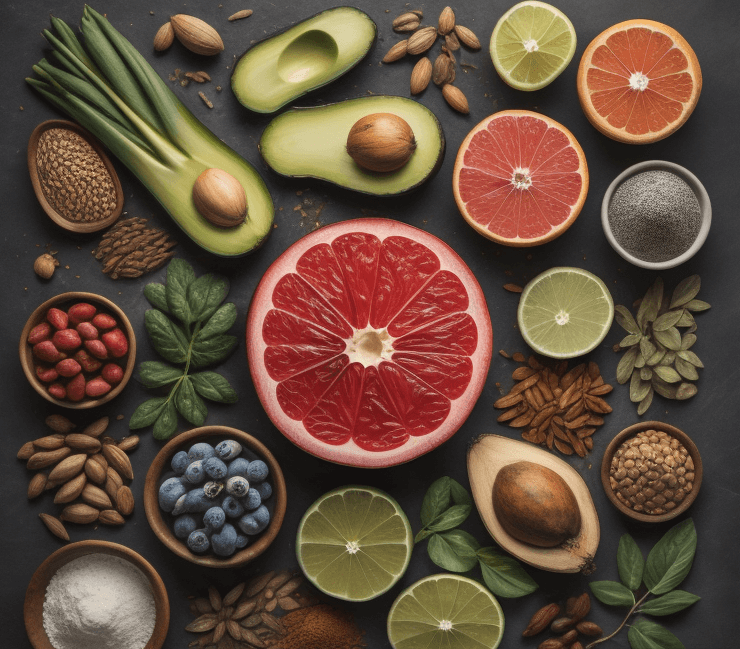Heart Health
Superpowers of Superfoods: Nourishing Your Way to Optimal Health
Superfoods are a class of nutrient-dense foods with a host of health advantages. They are abundant in nutrients that support general health and vigor, including as vitamins, minerals, antioxidants, and other bioactive substances. Dark berries, fatty fish, fermented foods, leafy greens, soy, tea, and dark chocolate are a few examples of superfoods. Flavonoids found in dark berries promote heart and brain health, and omega-3 fatty acids found in fatty fish guard against degenerative illnesses. Probiotics from fermented foods help maintain gut health, and leafy greens are a great source of vitamins and minerals. Including a range of superfoods in the diet can help avoid chronic illnesses and improve general health. Superfoods should not be relied upon, but rather should be a component of a healthy, balanced diet.
1. Berries: Nature’s Antioxidant Bounty
Because they include a variety of vital nutrients and antioxidants that promote optimum health, berries are a crucial component of a balanced diet. They are high in fiber, vitamins, and phytochemicals like anthocyanins that strengthen the immune system, lower inflammation, and fight oxidative stress. You may have a tasty and nourishing method to support general health and wellbeing by include a range of berries in your diet. Whether you like juicy blueberries, bright raspberries, or any other fruit, these antioxidant-packed gems are a wonderful complement to any diet.
2. Salmon: Omega-3 Oasis for Heart Health
Oily fish, such mackerel, trout, and salmon, are very nutrient-dense and a good source of omega-3 fatty acids. These essential fats significantly reduce the risk of developing cardiovascular disease by protecting the heart. They also support the best possible brain function and have the potential to reduce inflammation in the body. Regular consumption of salmon or other fatty fish not only allows people to have a satisfying meal but also gives their bodies and minds vital nutrients that promote general health and wellbeing.
3. Leafy Greens: Verdant Vessels of Nutrients
Among the leafy greens, kale, spinach, and Swiss chard are nutritious powerhouses, containing a wide range of vital vitamins, minerals, and potent antioxidants. Packed with of essential vitamins A, C, and K, potassium, and folate, they promote a multitude of body processes, from immune system fortification to blood coagulation. These greens are unique in that they may be used in a wide variety of culinary preparations due to their exceptional adaptability. Whether used as a colorful garnish to salads, mixed into refreshing smoothies, or offered as a tasty side dish, these leafy beauties not only improve the flavor of food but also provide a host of health advantages, making them a great option for a filling and balanced diet.

4. Quinoa: The Complete Protein Grain
Ancient grain quinoa is a nutritional powerhouse that provides a complete protein supply that includes all of the key amino acids. Quinoa is high in fiber, B vitamins, and essential minerals like phosphorus and magnesium in addition to protein. This special blend of nutrients promotes steady blood sugar levels, helps with digestion, and encourages the building of muscle. Choosing quinoa instead of other grains improves the nutritional value of your dishes and allows you to utilize a flexible ingredient that adds several health advantages to your diet. It is a wonderful complement to a healthful and well-balanced culinary repertoire due to its outstanding array of nutrients.
5. Avocado: The Creamy Heart-Healthy Delight
The avocado is a fruit that may be used in a variety of ways. It is a strong source of monounsaturated fats, which are essential for heart health since they actively lower levels of “bad” LDL cholesterol. Avocados include a lot of fiber, potassium, and antioxidants in addition to heart-healthy lipids. This vitamin combination has a wide range of advantages, including lowering inflammation in the body and encouraging satiety. Avocados are a delicious addition to a heart-healthy diet, whether they are eaten plain on toast, incorporated into colorful salads, or combined into a rich and creamy guacamole.
6. Chia Seeds: Tiny Powerhouses of Nutrition
Chia seeds are tiny, powerful nutritional powerhouses with a wide range of advantages. These small seeds are packed with of protein, fiber, and important minerals. They are also rich in omega-3 fatty acids. Their high fiber content promotes a healthy digestive tract and aids in blood sugar regulation. Additionally, the omega-3 fatty acids included in chia seeds support heart health. They are easily incorporated into many other recipes; add them to smoothies for an extra nutritional punch, to yogurt for a crunchy topping, or use them as a filler for healthy puddings. They are a great complement to a balanced diet because of their adaptability.
7. Turmeric: The Golden Healer
The bright spice turmeric is well-known for its potent active ingredient, curcumin, which has a wide range of health benefits including strong anti-inflammatory effects. Including turmeric in your diet can help reduce inflammation, which will benefit your joints. Furthermore, by lowering inflammation and raising cholesterol, turmeric promotes heart health and helps with digestion. Turmeric is a useful spice that has many health benefits that you can include into your daily routine. It may be used in cooking to give foods more taste and color or savored as a calming golden milk latte.
Superfoods are not merely a trend; they represent a nutritional revolution that empowers individuals to take charge of their health and well-being. By incorporating these nutrient-rich powerhouses into your diet, you’re providing your body with the tools it needs to thrive. Remember, the journey to optimal health begins with every mindful bite you take.


